|
|
|
Sort Order |
|
|
|
Items / Page
|
|
|
|
|
|
|
| Srl | Item |
| 1 |
ID:
140052
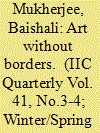

|
|
|
| 2 |
ID:
121886
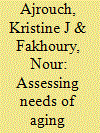

|
|
|
|
|
| Publication |
2013.
|
| Summary/Abstract |
The purpose of this study was to provide a critical perspective on the needs of aging Muslims by focusing on a diverse group of older adults including those with ancestry from African American, South Asian, Arab, and Albanian origins. Four focus group discussions were conducted with adults aged 60+ recruited from four Muslim centers in the metro-Detroit area. Grounded analysis uncovered themes related to needs, strengths and challenges in the Muslim community, as well as suggestions for the way forward in addressing aging issues. Needs identified include quality of life and social relations. Strengths included references to tradition and scripture. Challenges named referred to conflict both within and outside of the family. Finally, the way forward consisted of the desire for options to support aging families within the community, often in small steps, though not necessarily only through mosques. Findings also suggested that women may be a key agent of change within the Muslim community. In sum, this study uncovered areas of overlap and at times disagreement between and within groups, underlining the fact that there is no one kind of Muslim aging, and that any approach to caring for Muslims must combine cultural sensitivity with flexibility in order to minimize anxiety and stress for both elders and their families.
|
|
|
|
|
|
|
|
|
|
|
|
|
|
|
|
| 3 |
ID:
170668


|
|
|
|
|
| Summary/Abstract |
This issue of South Asia Research (SAR) marks and celebrates 40 years of an academic venture that began in very different conditions than one faces in publishing today. Initially, it was quite a modest in-house product, with the first issue of this journal published in May 1981. The decision at SOAS in 1980 to establish a journal run by doctoral students involved a team including the historian Rosalind O’Hanlon, now Professor of Indian History and Culture at Oxford, the historian Vanessa Harvey-Samuel and the anthropologist Catherine Thompson. The moment of taking the initiative to use print to stimulate progress, academically as well as personally, matches remarkably well with the research focus of many South Asianists on the role of the printing press. It appears in the work of O’Hanlon herself on Marathi sources and is still present in recent studies that illustrate, for example, how a Tamil religious leader and his followers ‘used print as a tool to garner religious and textual authority’ (Weiss, 2019: 52). Seen in this light, the creation and production of SAR was a landmark event in the development of South Asian Studies not just at SOAS but globally. Forty years later we are, indeed, a truly global journal, respected (and cited) worldwide.
|
|
|
|
|
|
|
|
|
|
|
|
|
|
|
|
| 4 |
ID:
123760
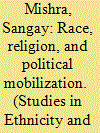

|
|
|
|
|
| Publication |
2013.
|
| Summary/Abstract |
In the days and months following 11 September 2001, South Asians in the United States were lumped together and racialized as 'outsiders' and 'threatening'. The lumping of South Asians existed alongside their differential targeting based on particular religious identities such as Hindu, Muslim, and Sikh. The religious identity not only shaped and calibrated the racial hostility against different South Asian groups but also framed their responses to racial attacks. The primacy of religious identities in framing the group response to racial hostility made it difficult to build broader panethnic solidarity, thereby challenging the existing understanding of the dynamics of panethnic identity formation and mobilization. The foregrounding of religious identity by different South Asian groups was, in fact, in broad consonance with the multicultural institutional and ideological framework that provides institutional and discursive avenues for the deployment of exclusive and immutable identities.
|
|
|
|
|
|
|
|
|
|
|
|
|
|
|
|
| 5 |
ID:
133914
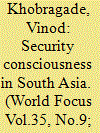

|
|
|
|
|
| Publication |
2014.
|
| Summary/Abstract |
Perceiving security threats from each other especially India's threat to Pakistan and vice-versa, and China's threat to India, the traditional rivals have been engaged in aggrandizing and modernization of their military structures and in this direction they have maximized their defence budgets at the larger scale. Moreover, because of multiple security problems within and outside the state, almost all the South Asian states are also indulged in acquiring defence shields
|
|
|
|
|
|
|
|
|
|
|
|
|
|
|
|
| 6 |
ID:
140063
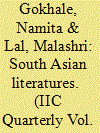

|
|
|
| 7 |
ID:
085158


|
|
|
|
|
| Publication |
DelhI, B R Publishing Corporation, 19888.
|
| Description |
286 p.
|
| Standard Number |
8170184673
|
|
|
|
|
|
|
|
|
|
|
|
Copies: C:1/I:0,R:0,Q:0
Circulation
| Accession# | Call# | Current Location | Status | Policy | Location |
| 028918 | 320.954/SEN 028918 | Main | On Shelf | General | |
|
|
|
|
| 8 |
ID:
174365
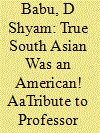

|
|
|
|
|
| Summary/Abstract |
Two stellar accomplishments of Professor Stephen Cohen have come to the fore in the days following his death on October 27, 2019. First, he was not only the doyen of South Asian security studies, but he had created the field. The scholars who are prominent now in the field are either his students, his mentees, or in many cases, the students of his students (his “grand-students,” in his words).
|
|
|
|
|
|
|
|
|
|
|
|
|
|
|
|
| 9 |
ID:
112763
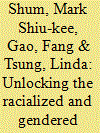

|
|
|
|
|
| Publication |
2012.
|
| Summary/Abstract |
Educating South Asians with different language and cultural backgrounds and integrating them into mainstream society have been a challenge for the educational system of Hong Kong. This study documents the educational experiences of a group of Pakistani girls in the contexts of home, community, and school in Hong Kong. Using ethnographic methods, data collection is based on interviews evoking their life stories. These stories recount how Pakistani girls attempt to negotiate with traditional customs, religion and mainstream stereotypes and to construct racialized and gendered schooling experiences. This study highlights the importance of mainstream engagement in regard to critical learning about cultural and linguistic diversity. It is claimed that minorities have an active role as agents in social transformation and change in achieving racial and gender equality, in this case for the most disadvantaged minority females, within the asymmetrical power relationships between local Chinese and South Asian minorities in Hong Kong.
|
|
|
|
|
|
|
|
|
|
|
|
|
|
|
|
|
|
|
|
|